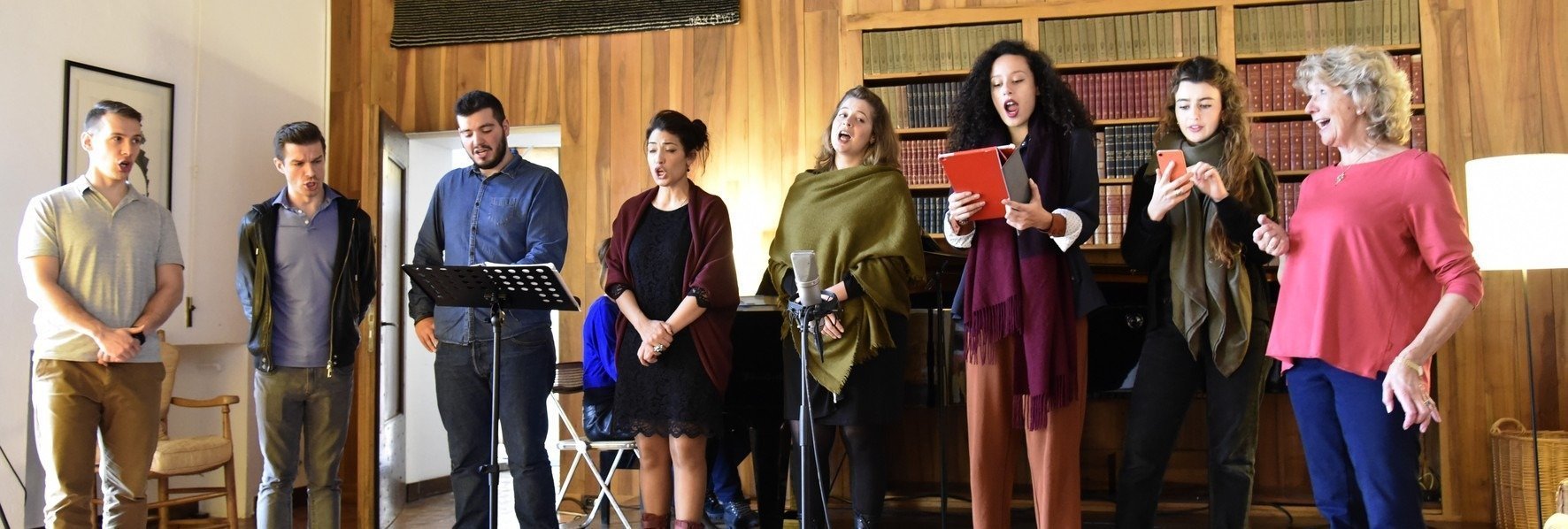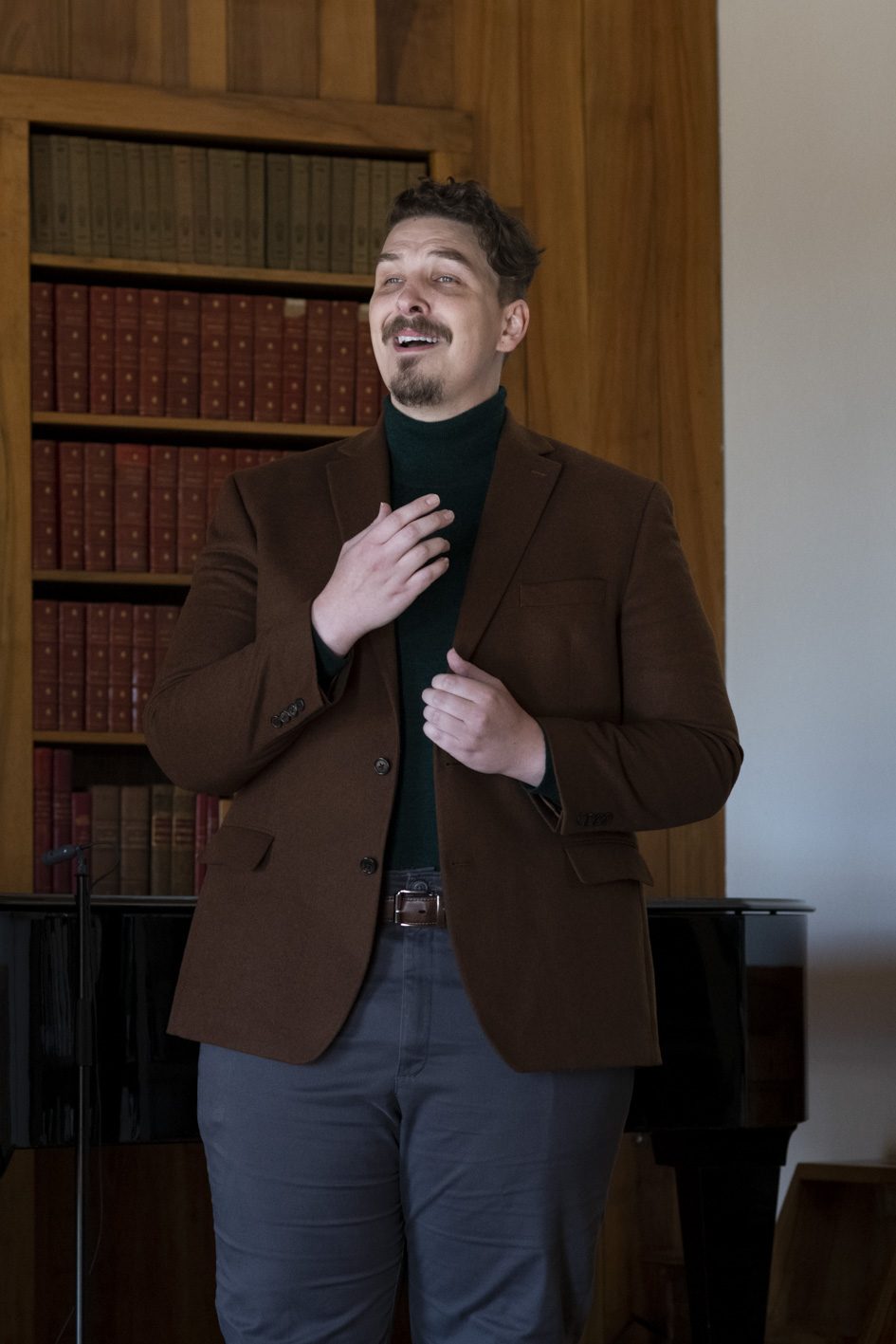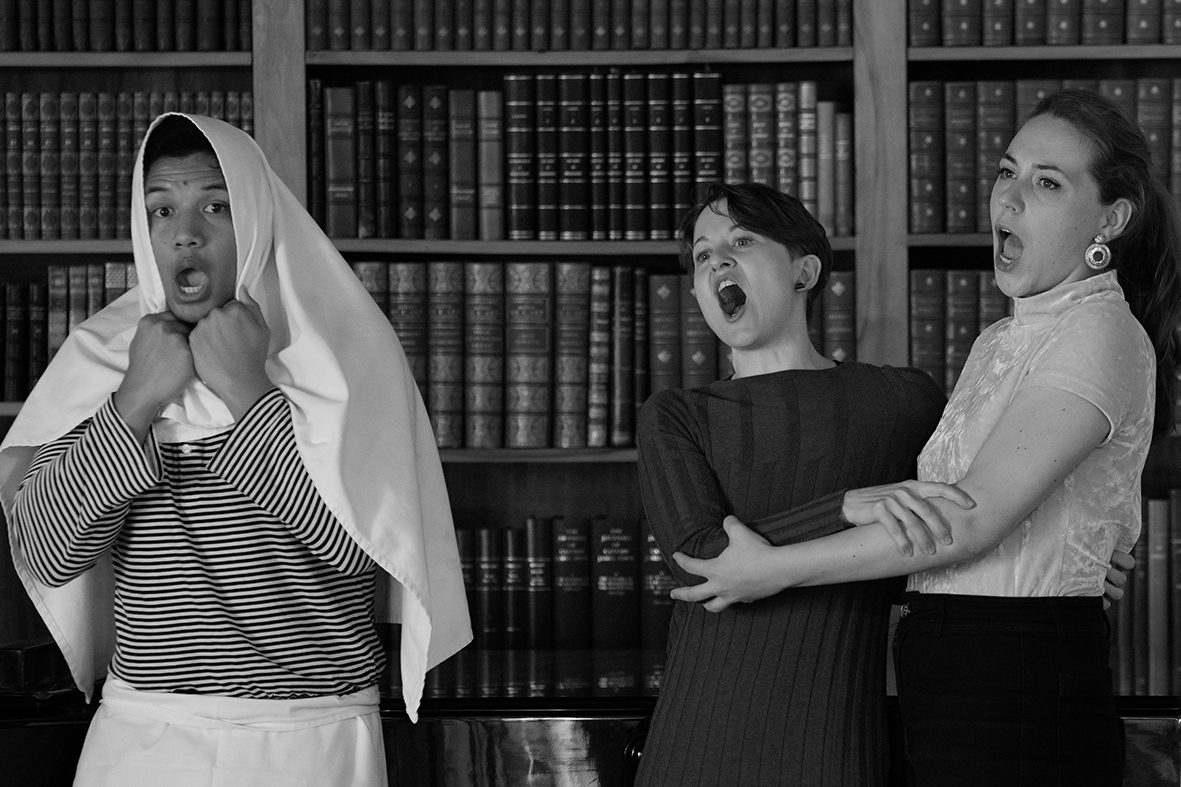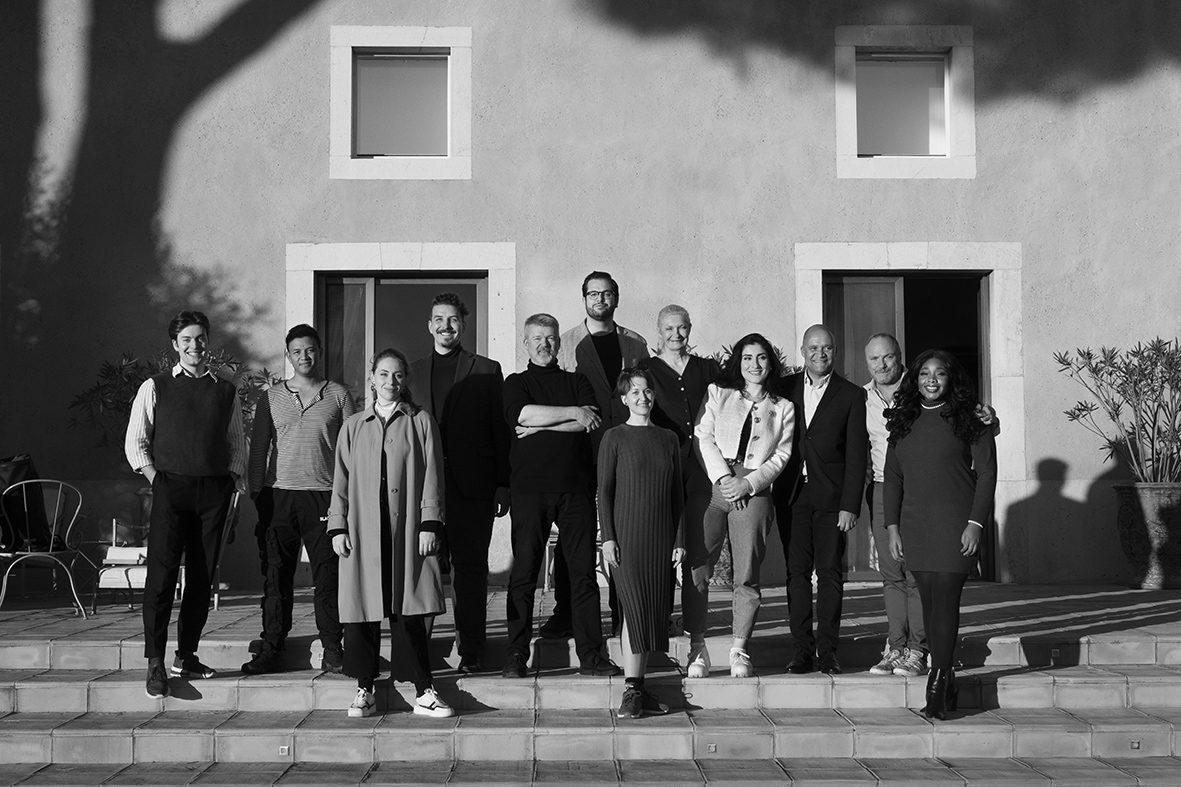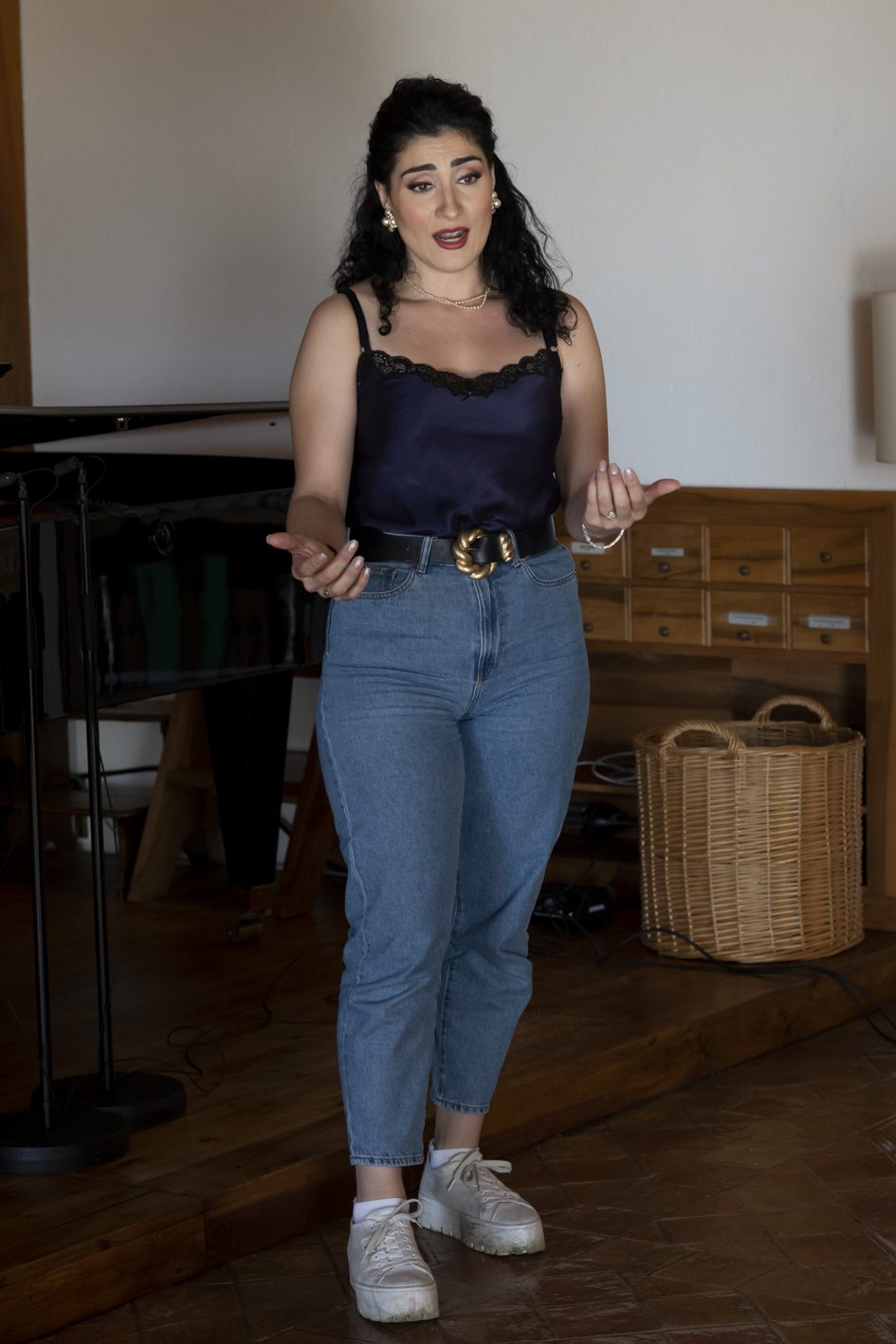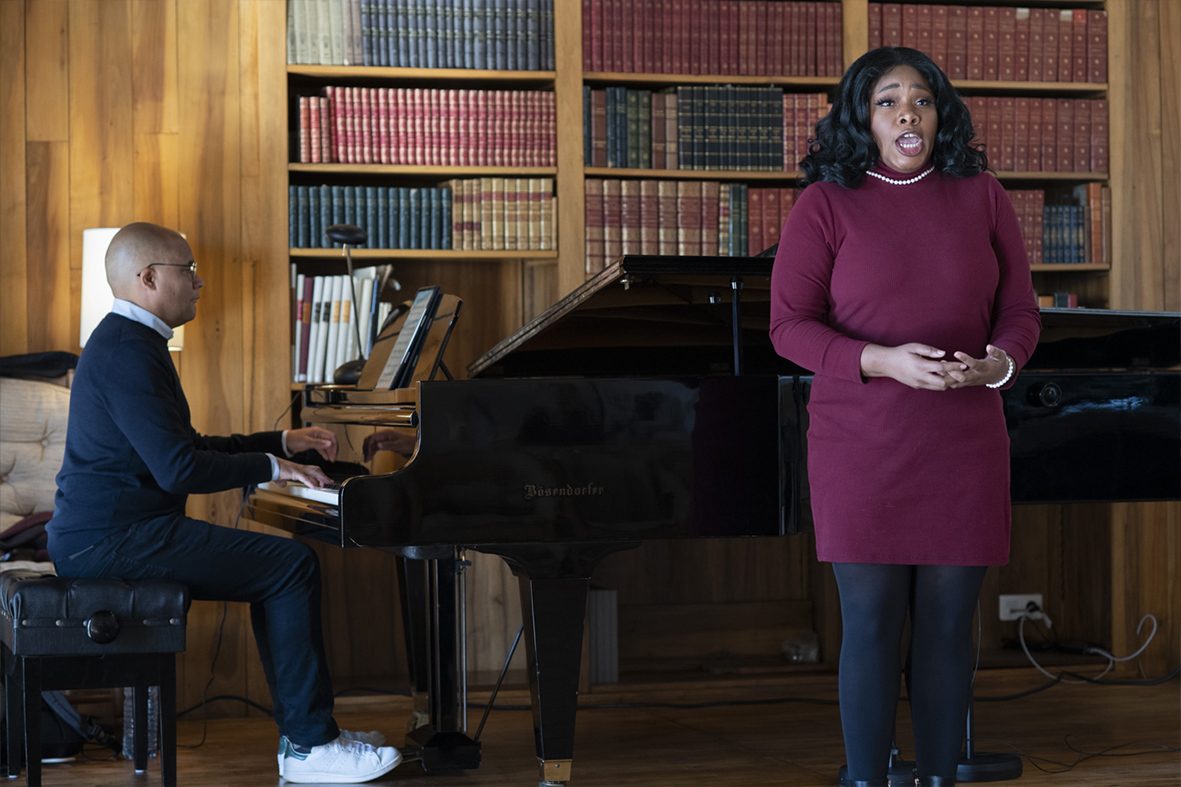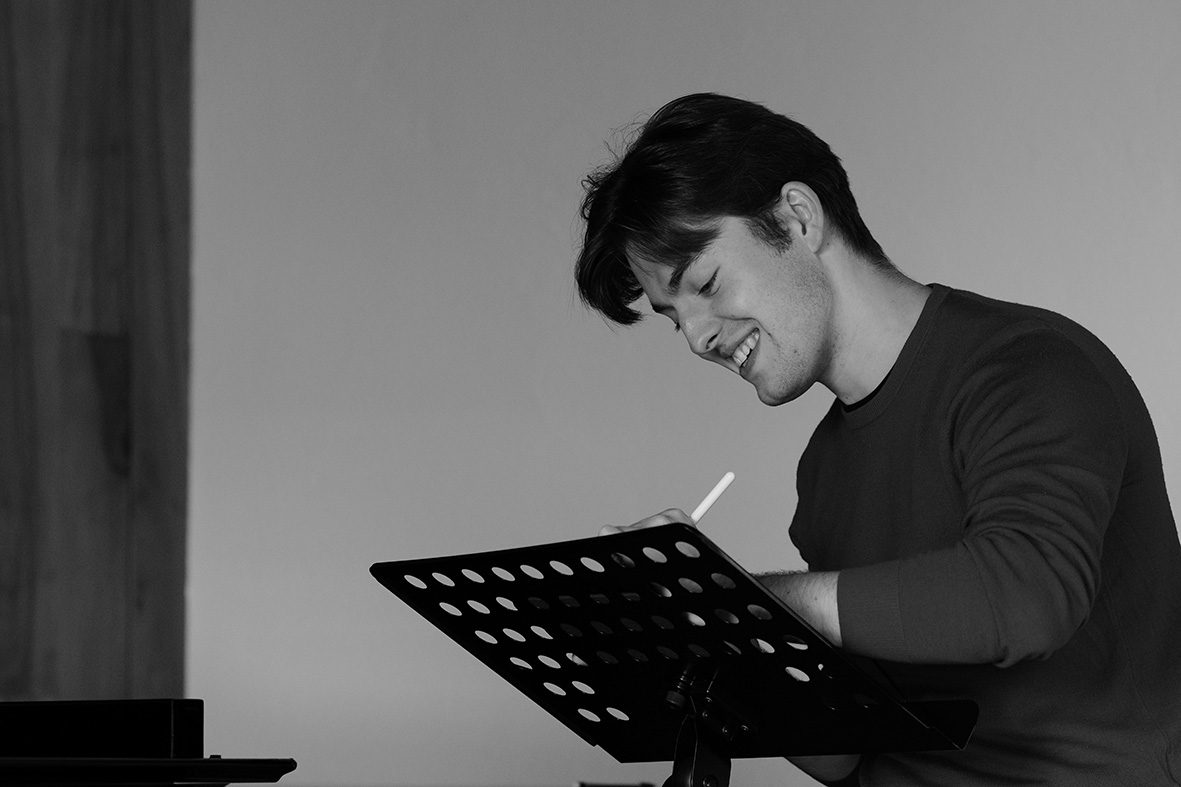During the lifetime of Anne Gruner Schlumberger, young musicians and their teachers were welcomed as interns at Les Treilles. At the end of each session, a concert was organized in the music room of the Grande Maison.
Anxious to reconnect with this musical tradition, the Treilles Foundation has created a Voice Academy whose vocation is to offer young professionals a place and an institutional support allowing them to perfect, beyond the vocal technique, the performing art. The Voice Academy is directed by Ivan Alexandre, musicologist, director, assisted by Julien Benhamou, artistic advisor in charge of the casting of the Festival International d’Art Lyrique d’Aix-en-Provence and Alain Perroux, director of the National Opera of the Rhine.
Each year, the master-class is supervised by renowned singers.
Seasons
Rossini & Cie
Management : Ivan Alexandre, musicologist, director, assisted by Julien Benhamou, artistic director of the International Festival of lyric art in Aix-en-Provence and casting advisor of the Metropolitan Opera of New York.
Guest Professor : Rockwell Blake.
Since singing has become a major art, nothing has been going well. A long lament that has never been extinguished: where has our golden age gone? In his treatise published in 1723, the illustrious castrato Pier Francesco Tosi attacks in the first chapter: « Gentlemen masters, we no longer hear in Italy the beautiful voices that we once heard there ». Who is to blame? The masters, precisely. Bernard Shaw in his daily newspaper The Star in 1889: «Often, in my youth, I meditated on the curious but almost invariable failure of music schools to produce good singers ». Champion of our « high school », author of Tancredi and Semiramide, did not Rossini himself condemn in his old age the « frightful decadence » of beautiful singing?
And then suddenly…
Rossini was no more than an amiable buffo, dashing off frenzied comedies, frivolous arias, clever ensembles and dizzying crescendos, when an unforeseen generation allowed in a few years the return of Maometto secondo, Otello, Semiramide, the Viaggio a Reims, of La donna del lago… At first timid, this Rossini renaissance settled in Pesaro and was transformed, towards the end of the twentieth century, into a planetary phenomenon. It is not a composer who comes back to life, it is a style, a breath, a language, a discipline, a boldness, a palette of colors and nuances. An art. That of Rossini, but also of Mercadante, Mayr, Donizetti, Meyerbeer & Cie.
The North Star of this generation, Rockwell Blake gave back their native song to the Ilos, the Idrenos, the Giacomos, the Libenskofs… and even to the lost Almavivas. Like Mitridate or Robert the Devil. Let us measure our luck to welcome the great American tenor as a guest professor this year.
Four centuries of Bel Canto
Management : Ivan Alexandre, musicologist, director, assisted by Julien Benhamou, artistic director of the International Festival of lyric art in Aix-en-Provence and casting advisor of the Metropolitan Opera of New York.
Guest Professor : Nelly Miricioiu.
- Sopranos : Emma Fekete, Gloria Tronel
- Mezzo-sopranos : Joanne Evans, Kathleen Felty
- Tenors : Bastien Rimondi, Sun Tianxuefei
- Bass-barytone : Oleg Volkov
- Bass : Adrien Mathonat
The Grove Dictionary offers this definition of bel canto: “Vocal style of the 18th and early 19th centuries, the principles of which are based on perfect legato whatever the range, lightening of the high notes, agile and flexible delivery.”
In other words the complete song. The possibility of expressing everything, beyond words, through the sole mastery of the instrument. The art of singing in itself regardless of genre, character and even voice.
Also regardless of the era. If we recognize the bel canto assoluto in the virtuosity of a Farinelli or the great vocal spectacle of a Rossini, did not the same Rossini already deplore his “horrible decadence”? Wouldn’t bel canto be nostalgia for divine songs, for an ideal, for an Eden that has necessarily disappeared?
The truth is that the tenor Giulio Caccini laid the foundations in his contemporary Nuove musiche of the first operas. And its rules permeate Norma, Rigoletto, Les Huguenots, Lakmé, up to the arabesques of Boito, Catalani, Strauss and beyond.
Of the much-maligned “roulade”, which we call vocalization today, Balzac says that “it crosses space by sowing its seeds in the air which, picked up by the ears, flower in the depths of the heart”. Between L’Orfeo by Monteverdi and The Tempest by Thomas Adès, let us visit these four centuries of flowering by taking as our guide the sovereign belcantist Nelly Miricioiu, emerging as Queen of the Night and titular of Lucia, Bolena, Tosca, finally all the heroines of the repertoire whose flesh is song.
French Opera
Management : Ivan Alexandre, musicologist, director, assisted by Julien Benhamou, artistic director of the International Festival of lyric art in Aix-en-Provence and casting advisor of the Metropolitan Opera of New York and Alain Perroux, director of the Rhine National Opera.
Guest Professor : Annick Massis
Lyric artists selected :
- Sopranos : Claire Antoine, Brittany Olivia Logan, Alina Wunderlin
- Mezzo-soprano : Floriane Hasler
- Tenors : Laurence Kilsby, Sahy Ratia
- Barytone: Sergio Villegas-Galvain
- Bass : Stefan Egerstrom
- Photos : © Julie Bourges and Dominique Laugé
In order of appearance on the stage, French singing was the second to reign over European opera, after Italian but before German, Russian or Czech, which only imposed themselves thanks to the romantic impulse for the term “national”.
Established by Louis XIV in 1669, inaugurated two years later, French opera was not intended to be national. From its birth it was a genre in itself, coded but universal. A multiple art inherited from both aristocratic ballet and tragic declamation. Dance, energy, fantasy, elocution mingle in lush decors. Great show and text-king: this paradox sets us apart.
In any case, this is how our art imposed itself from Pomona to Saint-François d’Assise, expanded according to fashions and influences, but perpetuated by Rameau, Grétry, Berlioz, Gounod, Bizet, Massenet, Debussy, Poulenc and others. Art claimed to be contrary to Italian bel canto, and yet so vocal. So diverse in its uniqueness. Doesn’t he owe his masterpieces to the Europeans Lulli, Gluck, Meyerbeer, Rossini, Donizetti, Verdi, Offenbach?
It is this art, delicate and yet strong enough to remain alive three and a half centuries after its invention, that the Voice Academy proposes to transmit over the course of a week at Les Treilles, whose guest teacher will be the incomparable Annick Massis. Style, language, technique, repertoire, who better than the Parisian soprano – assisted as every season by our vocal coaches and our artistic team – can transmit opera’ secrets today?
Opera during the 20th and 21st centuries
Management : Ivan Alexandre, musicologist, director, assisted by Julien Benhamou, artistic director of the Festival International d’Art Lyrique d’Aix-en-Provence and Isla Mundell Perkins, casting director of the Staatsoper Hamburg.
Guest Professor : Dame Felicity Palmer
Lyric artists selected: :
- Sopranos : Lucie Peyramaure & Johanna Wallroth
- Mezzo-soprano : Claire Barnett-Jones
- Countertenor : Paul Figuier
- Tenors : John Findon & Yoann Le Lan
- Bass-Barytone : Cody Quattlebaum
- Bass : Sulkhan Jaiani
Pianists and song coaches : Nino Pavlenichvili et Alphonse Cemin
Mozart, Verdi, Puccini, Rossini, Wagner, Donizetti, Bizet, Johann Strauss II, Tchaikovsky and Handel. Here, in descending order, are the top 10 opera composers most often displayed in the world this season. Neither Britten nor Janacek. Even Richard Strauss goes after Johann!
But let’s not pity ourselves. Our time is coming. In recent years the repertoire has not only expanded to Baroque circles. The 20th century emerges from the shadows. Titles still scattered in the 1970s are today starring in New York (Porgy and Bess, The Rake’s Progress, Akhnaten), in Munich (The Nose, The Little Cunning Fox, Peter Grimes, The Devils of Loudun), in Milan (Ariadne auf Naxos, The Tempest), in Paris (End of Party, A Quiet Place, Wozzeck), finally everywhere. And the 21st century is also progressing, especially in the USA where resides the most performed living composer on our planet, Philip Glass.
In France, the 19th century ends with Louise (1900) ; the 20th century began with Pelléas et Mélisande (1902) then made us discover Ravel, Messager, Poulenc, Messiaen, which are « classics » today. Here as elsewhere, Jenufa, Billy Budd, Lady Macbeth of Mzensk, The Love for Three Oranges, Bluebeard’s Castle, Capriccio, The Dead City, Lulu, Carmélites dialogues, Mahagonny, Le Grand Macabre, Flight, have imposed themselves. Love from far away, Written on Skin… not to mention the Turandot and Wozzeck poles that still catch our ears a hundred years after the premiere, the musical scholars of Stephen Sondheim or the experiences of musical theatre.
It is to all of them that we dedicate the sixth Voice Academy under the guidance of our guest teacher Dame Felicity Palmer, monumental Leokadja in Mahagonny, unforgettable Klytemnestra in Elektra, incomparable prioress in the Poulenc Dialogues and creator of Abbess Josefa in Love and Other Demons by Péter Eötvös.
The romantic bel canto
Management: Ivan Alexandre, musicologist, director, assisted by Julien Benhamou, artistic advisor in charge of the casting of the Festival International d’Art Lyrique d’Aix-en-Provence and Alain Perroux, director of the Opéra national du Rhin.
Guest Professor: Patrizia Ciofi
Lyric artists selected:
- Sopranos: Sandra Hamaoui et Libby Sokolowski
- Mezzo-sopranos: Eugénie Joneau et Héloïse Mas
- Tenors: Christopher Sokolowski et Valentin Thill
- Baritone: Ivan Thirion
- Bass: Brent Michael Smith
Pianists and song coach : Nino Pavlenichvili et Antoine Palloc
In 1866, old Rossini took a nostalgic look at the art of castrati. “Their abolition, he wrote to the historian Ferrucci, was at the origin of the appalling decline of the Italian bel canto”.
“Frightful decadence” in 1866! But what does the composer of La Cenerentola and Semiramide mean by bel canto?
This beautiful song dates back to the end of the 17th century. It was not based on natural expression, but on the supernatural rise of the human voice towards regions of the soul where speech has no access. Of the much-criticized “roulade”, which we now call vocal exercise, Balzac even says that “it crosses space, sowing its germs in the air which, picked up by the ears, flower deep in the heart”.
But it’s not all about rolling and vocal sports. This beautiful song touches first of all by the mastery of the breath, the anointing of the line, the variety of colors – “coloring” (vocally athletic style) exactly. One day when Lady Joan Sutherland was asked to define bel canto, she replied: “the high piano”.
If Rossini regrets Farinelli’s time, he himself belongs to this first romantic school which does not only want to renounce to the prestige of singing as a religion, but opens up unexpected horizons. His successors Bellini and Donizetti in turn will pay tribute to this major conquest of Italian culture. Even Verdi, who first imposed himself against this ornament, ends up in Rigoletto or La Traviata by practicing this ancient magic as a master.
It is therefore to them that the Voice Academy will dedicate its fifth edition, over the course of a week to Les Treilles, whose guest professor will be the immense Belcantist Patrizia Ciofi. Style, syntax, technique, repertoire, who better than the Tuscan soprano can transmit to young artists the secrets of this both sensual and celestial song ?
Three centuries of French Opera
Management: Ivan Alexandre, musicologist, director, assisted by Julien Benhamou, director of casting and artistic coordination of the Opéra National de Bordeaux and Alain Perroux, director of the Opéra National du Rhin
Guest Professor: Annick Massis
Lyric artists selected:
- Sopranos: Inna Kalugina and Catherine Trottmann
- Mezzo-sopranos: Alix Le Saux and Eva Zaïcik
- Tenor: Kaëlig Boché and Grégoire Mour
- Baritone: Igor Onishchenko
- Bass-baritone : Guilhem Worms
Pianists and song coach: Annabel Thwaite and Alphonse Cemin
2019 saw the celebration of the seven half-centuries of our Royal Academy of Music, whose name was first given by Louis XIV to the Paris Opera.
Considered as an early cultural exception, the genre instituted in 1669 is more than a particular form of sung theater. It is a complete art, inherited from both the royal ballet and the tragic declamation, in every point distinct from the Italian opera which reigned for a long time throughout Europe.
Its founding paradox: the choreographic energy is mixed from the start with what the late director of the Lyric School Michel Sénéchal used to call a “song of pronunciation”. An art based both on great show and on the subtleties of a language nourished by “hidden meaning”.
This is a singular art which affirms its singularity from Pomona to Saint-François of Assisi, and was enlarged according to fashions and influences, but perpetuated relentlessly by Rameau, Grétry, Berlioz, Gounod, Bizet, Massenet, Debussy, Poulenc and other famous composers. It has been claimed to be contrary to the Italian bel canto, yet it is universal in its history and its heroes. Don’t we owe its masterpieces to the Europeans Lulli, Gluck, Meyerbeer, Rossini, Donizetti, Verdi, Offenbach?
It is this delicate but powerful enough art, still alive three and a half centuries after its invention, that the Voice Academy proposes to transmit during a week at Les Treilles. Our guest professor will be the incomparable Annick Massis. Style, language, technique, repertoire, who better than the Parisian soprano can transmit her secrets today?
The 2020 Voice Academy had the support of the Schlumberger Foundation for Culture and Music.
Mozart… and after
Management: Ivan Alexandre, musicologist, producer and director of the Voice Academy, assisted by Julien Benhamou, director of casting and of artistic coordination of the Opéra National de Bordeaux and Alain Perroux, director of the National Opera of the Rhine.
Guest Professor: Dame Felicity Palmer
Lyric artists selected:
- Sopranos: Anna Dugan, Caroline Jestaedt et Cyrielle Ndjiki Nya
- Mezzo-sopranos: Adriana Bignagni Lesca et Natalie Pérez
- Tenor: Jérémie Schutz
- Baritone: Louis de Lavignère
- Bass-baritone: Jean-Fernand Setti
Pianists and song coach: Annabel Thwaite and Antoine Palloc
“O privilege of genius,” marvels Sacha Guitry, “when a piece of Mozart has just been played, the silence that follows is still his.” If the silence following Mozart is still Mozart, what about music? Wagner names Don Giovanni “the best opera ever”. At the end of his life, Gounod devotes an entire book to the same Don Juan, this “uninterrupted series of treasures,” adds Tchaikovsky, “with which everything that was written before and after turns pale.”
The opera that succeeds Mozart is still his: this will be our theme in 2019. Under the expert and thoughtful eye of Dame Felicity Palmer, we will explore together the various and often contrary paths that connect Mozart to his disciples Weber, Donizetti, Gounod, Verdi, Offenbach, J. Strauss, Bizet, Tchaikovsky, R. Strauss, Messenger, Korngold … Two centuries of quotations and tribute but above all of loyalty.
Loyalty to the magic recipe where expression, naturalness, cantabile, incarnation, show and simple truth are mixed, what we always call without being able to define it but that we cultivate because it is good for the vocal cords and the ears, the body and the mind: the mozartian song.
Mozart and Da Ponte
Management: Ivan Alexandre, musicologist, producer and director of the Voice Academy, assisted by Julien Benhamou, director of casting and of artistic coordination of the Opéra National de Bordeaux and Alain Perroux, director of artistic administration of the Festival d’Aix-en-Provence.
Guest Professor: Dame Felicity Lott
Lyric artists selected:
- Sopranos: Sandrine Buendia et Marie Perbost
- Mezzo-sopranos: Adèle Charvet et Violette Polchi
- Tenors: Paco Garcia et Sebastian Monti
- Baritone: Michał Janicki
- Bass-baritone: André Courville
Pianists and song coach: Edwige Herchenroder and Karolos Zouganelis
In 1783, Mozart was finally established in Vienna. The triumph of his Entführung aus dem Serail had just given the German troupe of the capital its legitimacy and fame. When suddenly the emperor changes his mind. As popular as it is, the German Singspiel is not prestigious enough for such a glorious court. Thus, Joseph II founds an Italian opera buffa company, supervised by the compositor Antonio Salieri…
… where Mozart yet again hopes for success. But the story slows down. Two attempts fail, and it is not until three years later that he gets the troupe to perform a work of his.
What a masterpiece! It is his Nozze di Figaro that he manages to give to the Burgtheater on the 1 May 1786, while the Mariage de Figaro by Beaumarchais remains prohibited in Vienna. Not quite as successful as the Serail, but still resounding enough for the emperor to edict a special rule: the encore on ensembles became illegal! Only arias could be sung twice if the clapping demanded it.
It’s that the rivals in melody – the Paisiello, the Cimarosa, the Salieri – enchant the public, while nobody, neither before or after, could rival with the dazzling duos, trios, sextets and finales of the Figaro.
In this field, Mozart can thank his muse, but also the poet who made this miracle possible: the abbot Lorenzo Da Ponte, cooperative and inspired librettist who, like him, possesses the magical gift of banishing the borders between buffo and seria, between large and small, between game and life.
After the founding Figaro, the partners would together create Don Giovanni (Prague 1787) and finally Così fan tutte (Vienna 1790), trio of masterpieces unique in its density, its diversity, its cruelty, its simple truth.
It is to this bottomless triptych that the second edition of our Voice Academy was devoted to, under the supervision of Dame Felicity Lott, who knows these characters, this singing and these feelings better than anyone.
The opera seria from Handel to Mozart
Director: Ivan Alexandre, musicologist, producer and director of the Voice Academy, assisted by Julien Benhamou, director of casting and of artistic coordination of the Opéra National de Bordeaux and Alain Perroux, director of artistic administration of the Festival d’Aix-en-Provence.
Guest Professor: Yvonne Kenny
Lyric artists selected:
- Sopranos: Harmonie Deschamps et Léa Frouté
- Mezzo-sopranos: Ambroisine Bré, Victoire Bunel, Anna Dowsley
- Tenor: Yu Shao
- Countertenor: Paul-Antoine Benos
- Bass-baritone: Thibaut de Damas
Pianists song coaches: Rūta Lenčiauskaitė et Gary Matthewman
Being a vague and distant memory, the opera seria had disappeared. During the whole of the nineteenth century and most of the twentieth century, it represented the abstract and artificial art of the castrates, supplanted by the emotional and “realist” singing of the Romantics, which still today represents the essence of our repertoire.
This Opera seria emerged from silence by means of a double resurrection: that of the Rossinian singing and of the baroque opera. It became then obvious that its vocalizations, ornaments, improvised cadences and forgotten language had nothing to do with a mere catalogue but, on the contrary, represented an ideal.
Born about 1700, this bel canto had been supplanted by Gluck’s dramatic genre and by the opera buffa by the end of the eighteenth century. The bel canto in the works of Porpora, Handel or young Mozart became the main object of the composition. Superhuman, the singer was the earthly messenger of a divine gift, master of an art that was opening the gates of heaven to the public who claimed in London in 1735: “One God, One Farinelli!”
But, what kind of art are we talking about? On the modern stage, for nearly half a century, the opera seria of Handel (Alcina, Ariodante, Giulio Cesare …) like that of Mozart (Mitridate, Lucio Silla …) have conquered a place that they did not enjoy even at their time. Rare until the 1980s, they are now applauded from Sydney to Aix-en-Provence and from the Staatsoper of Vienna to the Met of New York. But under what conditions? What are we really singing? How? What do we know about this lost bel canto, what can we learn from it and for what purpose?
To answer these questions, more delicate than it seems, the Foundation of Les Treilles has decided to dedicate the first session of its new Voice Academy to the opera seria. Under the direction of specialists, practice will respond to theory so that in the future, the beautiful chant will be heard again and even more forcefully.

